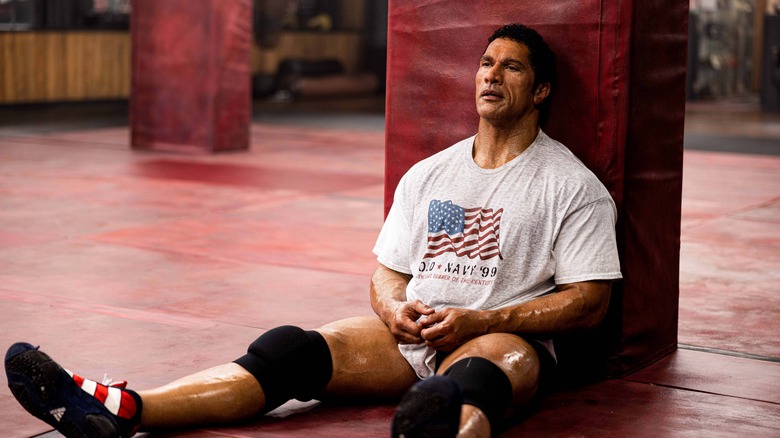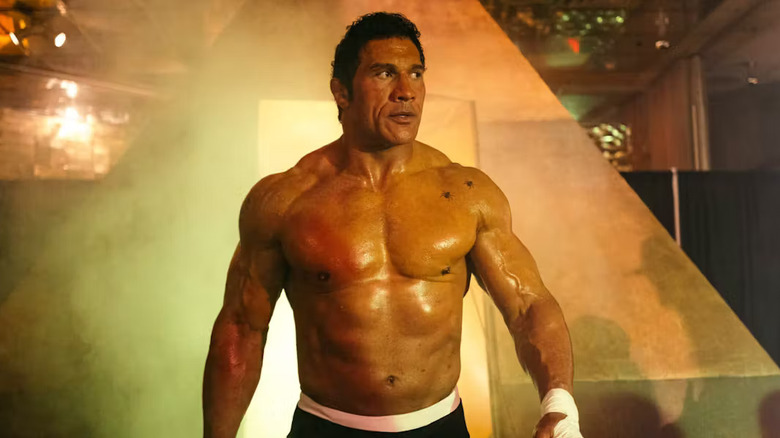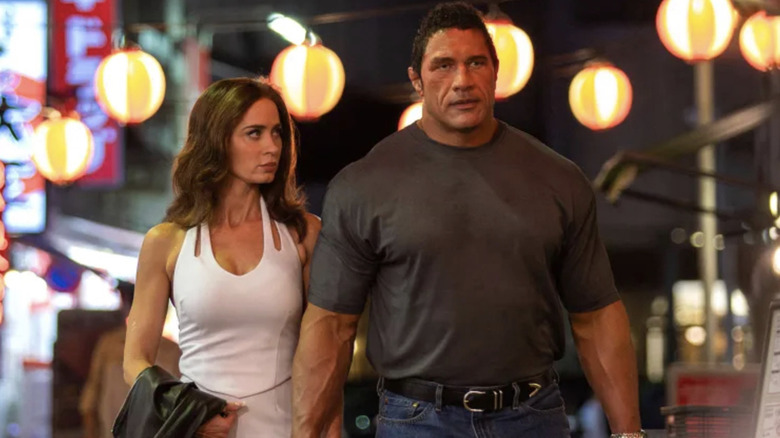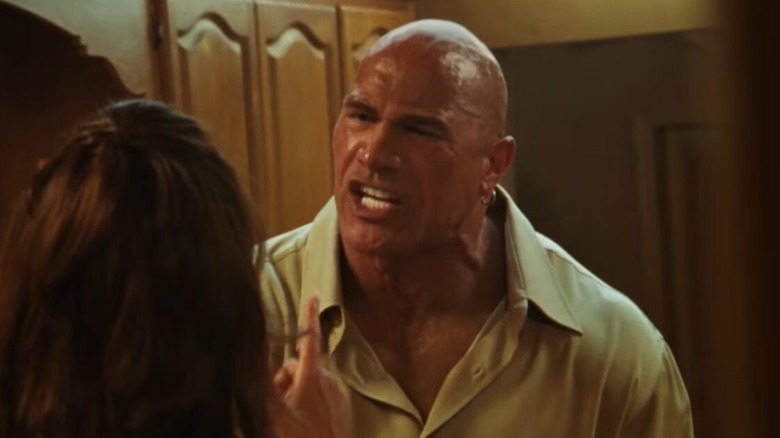The Smashing Machine Review: Benny Safdie And Dwayne Johnson's MMA Drama Packs A Subversive Punch
There has been a special allure to films about fighters, and it's not just to do with our (relatively) civil society's fascination with violence, though that's certainly part of it. Really, it's because these stories distill so much of what's compelling about drama into a tight-knit package. To wit: films about competitive fighters carry the connotations of the sports movie, yet are about the individual and not the team. They take a look at people who want to either better themselves or conquer their opponents, as well as everything in between. These are tales that aren't just about ambition, fame, and the pursuit of excellence, but are also stories about struggle where the wounds suffered are both emotional and physical. In essence, these films act as allegories for so many of us who look at life as a continuous bout, and life, just like people, contains multitudes.
That's exactly what Benny Safdie's latest film, "The Smashing Machine," is punching towards. The movie is a dramatization of the life of Mark Kerr, the former extreme wrestler and MMA (Mixed Martial Arts) fighter who was a major figure during the growing popularity of the UFC and PRIDE competitions throughout the late '90s and early '00s. Focusing primarily on the 13 years when Kerr was active in the fighting circuit, the film is a warts-and-all look at Kerr's life during that time, touching upon his opioid addiction as well as his rocky, often toxic relationship with his girlfriend, Dawn Staples (Emily Blunt). Playing Kerr is Dwayne Johnson, and while much is already being made of his transformative performance, it's a little erroneous to say that the actor is unrecognizable. Instead, his work as Kerr is remarkable for the way in which his "The Rock" persona is nowhere to be seen, and is replaced by the most multi-faceted character that Johnson has ever played. Safdie supports this performance by making a film which sets itself apart from the glut of movies about fighters while still containing so much of what makes them compelling. In the way in which Safdie makes the film a reflection of real life's mercurial morality, "The Smashing Machine" packs a subversive punch.
The Smashing Machine lets Johnson and Safdie develop a complex character in Mark Kerr
At first glance, Mark Kerr, as played by Johnson in "The Smashing Machine," seems like an average fighting movie protagonist. He's exceptionally strong, incredibly determined, fiercely competitive and has a magnetic charm about him, the type that does him favors both on and off camera. In tandem with that is the film's general plot structure, which contains most of the beats one has come to expect in both a fighting/boxing and biopic movie: Kerr's rise to fame and success, followed by an incident where his drug habit comes back to haunt him, followed by some more hardships, all of which leads to a climactic final bout, and so on. Yet Safdie never lets his film feel as rote as that sounds.
The movie immediately establishes a juxtaposition of tones during the opening credits, as Kerr talks excitedly at length to an interviewer about how euphoric winning feels while we watch the man pummel his opponent into bloody pulp. It's a statement which promises that the film isn't a sentimental crowd pleaser like "Rocky" or a downbeat character study like "The Wrestler." Instead, "The Smashing Machine" has an irresistible complexity to it akin to a documentary. Which is fitting, of course, since the film is partially based on the 2002 documentary about Kerr called "The Smashing Machine: The Life and Times of Extreme Fighter Mark Kerr." The film's fusion of documentary verisimilitude and dramatic depth is a combination which Safdie has demonstrated before in the films he made with his brother, Josh, and it comes through here in a big way. Cinematographer Maceo Bishop's 16mm cinematography gives the movie a period feel that also increases the tactility of the events, making it feel even less like a documentary and almost like watching Kerr's home movies.
Pun slightly intended, but through it all, Johnson is the rock which keeps the film centered. He makes Kerr a man of many faces while retaining a consistency of character, a feat which few narrative movies manage to accomplish. In other words, whether Kerr is seen throwing a violent temper tantrum, or manipulating a pharmacy clerk into giving him more drugs, or interacting with his fans, Johnson never portrays Kerr as duplicitous. The Kerr of "The Smashing Machine" is never less than earnest, at least in his own mind. Johnson's work here isn't transformative a la Robert De Niro in "Raging Bull," nor is it introspective as with Mickey Rourke in "The Wrestler." Instead, its down-to-earth steadiness is what's remarkable, especially coming from a man who's previously played larger-than-life figures on both sides of the camera.
Johnson and Blunt make an electric, explosive on-screen duo
Johnson's performance alone is worth the price of admission, but what makes "The Smashing Machine" truly special is the electric dynamism between Mark and Dawn. Emily Blunt is this film's secret weapon, and is proof that both leads in this movie are exploring new depths within their screen personas. While Johnson's is arguably more pronounced, Blunt's transformation into Dawn feels remarkable when compared to the myriad of characters she's become known for, who are primarily women infused with a pronounced strength. in stark contrast to Evelyn in "A Quiet Place," Kitty in "Oppenheimer," and Lily in "Jungle Cruise" (the film to first feature a Johnson and Blunt pairing), Blunt is remarkably broken as Dawn, allowing the woman's insecurities and penchant for emotional blackmail to be filtered through an outward display of fortitude. In other words, while Mark's physique is immediately intimidating, one may not recognize Dawn's potential for causing pain until it's too late.
As with the rest of the film, however, Mark and Dawn's relationship isn't portrayed in black and white, but vitriolic shades of gray. There's a ton of passion there, something which even Mark's good friend Mark Coleman (Ryan Bader) has to reluctantly admit as he rolls his eyes at Dawn's latest transgression instead of intervening. Johnson and Blunt's clear trust with each other as performers allows them to go to places in the film which only increases its realism. As a result, there are several scenes of their fighting which manages to capture the best of John Cassavetes' work, the verbal barbs stinging just as much as any of the kicks in the ring. The sheer intensity on display, combined with Nala Sinephro's jazz-infused score, not only recalls the anxiety of Safdie's "Uncut Gems" but makes the film feel like a dramatization of a Meatloaf song. Or even early Springsteen; sure, Darren Aronofsky may have gotten The Boss to write an original track for "The Wrestler," but Safdie uses "Jungleland" in "The Smashing Machine" so masterfully that it's hard to say which film best captures that spirit.
Safdie finds sublime moments in The Smashing Machine
While the film's fight scenes (both in and out of the ring) certainly reach the dizzying heights of the Safdie brothers' "Uncut Gems" and "Good Time," Benny Safdie isn't directly trying to compete with or best those movies. In other words, "The Smashing Machine" isn't one long, unflinching odyssey into anxiety. Instead, it's a surprisingly tender film. This tenderness is frequently at odds with Safdie's penchant for ironic detachment. It's especially noticeable when the film deals with the more unsavory aspects of Mark's life and behavior, which can leave the movie feeling emotionally cold at times — this is not an Oscar-bait weepie. Adding to that sense of detachment is the sheer unpredictability of the film; as I said earlier, "The Smashing Machine" does not conform to the typical beats of the sports movie or the biopic, which leaves it feeling like it doesn't quite come together until the very end.
Yet when that conclusion is finally reached, the film manages to evoke a catharsis which is undeniably unique, and it's a quality which can be seen threaded throughout the movie. There are moments of sublime, quiet tenderness during the film, and there's one scene that will be forever embedded in my mind after watching it, in which Mark patiently (and awkwardly) waits for Dawn while she rides on a Gravitron by herself at a fair. It's these little moments which Safdie, Johnson, and Blunt find throughout the movie, ones which add up to a cohesive and remarkably complex whole. For audiences curious to know the ins and outs of the early days of MMA fighting, you'd be better served by watching the 2002 documentary. If, however, you're more curious about the people involved, and if you're someone who feels like either a winner or a loser (or, more to the point, both at once) in life's big match, then "The Smashing Machine" is for you.
/Film Rating: 8 out of 10
"The Smashing Machine" premiered at the Venice Film Festival and is scheduled to be released in theaters on October 3, 2025.



